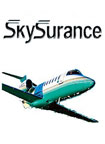|
|
Aircraft Insurance: Are You Covered?
Reading an insurance policy is not a favorite pastime for most people. As a result, most policyholders don't read their policies until after the loss. During over 25 years in the aviation insurance business, we have seen many situations in which the policyholder thinks coverage is included only to find out after the loss that none exists. Although coverage misunderstandings can and do occur in all lines of insurance, there is no coverage more misunderstood than the aviation insurance policy. Many people assume that the policy coverage for auto insurance and aircraft insurance are the same. In actuality, nothing could be further from the truth. We continually receive questions from clients, prospects and acquaintances involving some misunderstood points dealing with their aviation insurance coverage. In some cases these misconceptions are spawned by inaccurate advice from a well-meaning friend or professional advisor. When dealing with aviation insurance, don't guess. Dig out your policy and read it. Many aviation insurance policies being sold today are in a "plain talk" format and are much easier to understand than more traditional policy wordings. If reading your policy doesn't satisfy your curiosity, call an aviation insurance specialist for advice. We receive many calls of this type each month and we are always glad to help if we can. In reading this article, you may think the answer to a question is obvious. You may think, "who would ask such a stupid question?" Let us assure you, each topic was the result of a question from one of our clients or prospects. We always welcome any discussion regarding aviation insurance matters. Keep in mind the only truly stupid question is the one that is never asked. Are you covered?
Hull Premium
Earned In the Event of a Total Hull Loss
Hull Premium Earned In the Event Of A Total Hull Loss We hope you never have a hull insurance claim, but we all know that it is possible. In fact, the aviation insurance industry pays many millions of dollars every year for damaged aircraft. Recognizing this possibility, let us assume for a moment that your aircraft is severely damaged in an accident. In addition, the damage is so severe that the adjuster decides to "total" the aircraft and pay you the agreed value policy limit. He then takes possession of all the salvage, including the avionics. In a case like this you no longer have an aircraft to insure. You call your agent and instruct him to cancel your policy and return the unearned premium. Don't be surprised if your return premium is only calculated on the liability portion of the premium and the hull portion of the premium becomes fully earned in the event of a total loss. (Your deductible may not be your only out of pocket expense.) Insignificant, you say? It is not unusual for an owner of a more sophisticated aircraft to pay $10,000 or more for hull insurance. Although some very broad policies include "premium insurance" wording allowing the full unearned liability AND hull premium to be returned, it is quite normal for an aircraft hull insurance premium to be fully earned in the event of a total loss. It is best to ask before you buy. Wording variations you might look for:
Your Umbrella Insurance May Not
Include Aviation
When discussing needed limits of aircraft liability
with new clients, it is not unusual for a prospect to tell us his company only
needs a small primary or underlying limit of liability. Usually he will
nonchalantly ask for a limit of $1,000,000. He will usually say his company's
commercial umbrella liability policy applies over this primary layer and
carries his total limit of liability up to some satisfactory level.
It is a common misconception of business executives
that a commercial umbrella policy covers everything. We want to go on record
now and state, "THERE IS NO POLICY THAT COVERS EVERYTHING." In most cases,
commercial umbrella policies contain exclusions for aircraft and watercraft.
You will see restrictive wording that may say:
Although the exclusions in umbrella policies and in
excess liability policies vary in wording, most policies completely exclude
coverage for aircraft liability. We might add, personal umbrella policies also
exclude aviation exposures.
Some aviation insurance policies exclude coverage if
the pilot is impaired by alcohol, drugs, or toxic substances. "This section
does not provide protection for bodily injury or property damage caused at a
time when the ability of the pilot is impaired by alcohol, drugs, or toxic
substances."
44050 Russia Road | Lorain
County Regional Airport | Elyria, OH 44035
Maintained by |
|
 |
|




